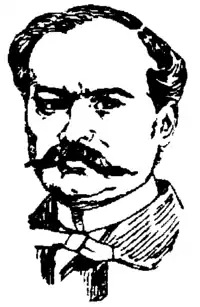Théodore Barrière
Théodore Barrière (1823 – 16 October 1877), French playwright, was born in Paris.

He belonged to a family of map engravers which had long been connected with the war department, and spent nine years in that service himself. The success of a vaudeville he had performed at the Beaumarchais and which was immediately snapped up for the repertory of the Palais Royal, showed him his real vocation. During the next thirty years he signed, alone or in collaboration, over a hundred plays; among the most successful were:
- La Vie de bohème (1849), adapted from Henri Murger’s book with the novelist's help
- Manon Lescaut (1851)
- Les Filles de marbre (1853) (subsequently adapted into English as The Marble Heart by Charles Selby)[1]
- Les Faux Bonshommes (1856) with Ernest Capendu
- L’Héritage de Monsieur Plumet (1858)
- Les Gens nerveux (1860), with Victorien Sardou[2]
- Malheureux vaincus (1865), which was forbidden by the censor
- Le Gascon (1878).
Barrière died in Paris.
Notes
- (27 May 1854). Dramatic - Adelphi, The Musical World, Vol. 32, No. 21, p. 352
- "Gale - Product Login".
References
- Chisholm, Hugh, ed. (1911). . Encyclopædia Britannica (11th ed.). Cambridge University Press.
External links
Wikimedia Commons has media related to Théodore Barrière.
This article is issued from Wikipedia. The text is licensed under Creative Commons - Attribution - Sharealike. Additional terms may apply for the media files.